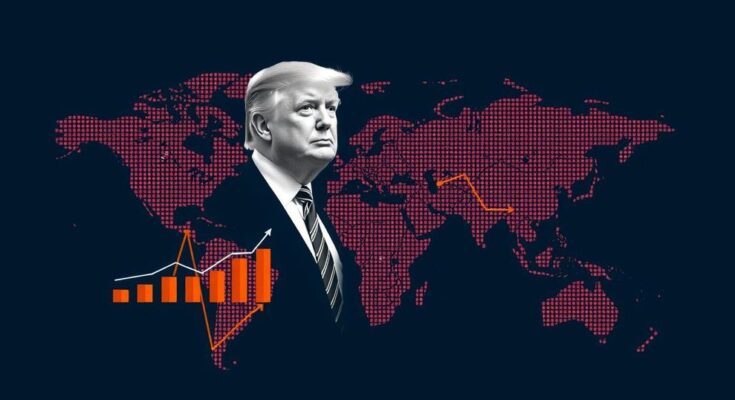Donald Trump’s recent election victory could reshape the global economy through his proposed tariffs on imports, reflecting an ongoing trend of U.S. inwardness. This article examines the implications of protectionist policies on domestic production and international trade, addressing the broader challenges such as subsidies that strain global relations and economic stability. Cooperation among nations is essential to counter these issues and foster a resilient economy moving forward.
The recent victory of Donald Trump in the 2024 election raises significant concerns regarding its implications for the global economy. With Trump’s ongoing threats of imposing tariffs on all imports to the United States, it becomes evident that the global landscape may face considerable disruptions. The United States, known for its technological advancements, is valued for its substantial contributions to research and development, yet the pressing challenge lies in minimizing global dependency on American economic prowess. Despite speculation regarding a potential change in leadership, it is important to recognize that the inward-focused policies characterized as “America First” have been prevalent across both political parties. From previous President Barack Obama’s emphasis on energy independence to Trump’s tariffs aimed at protecting U.S. producers, a common thread has emerged prioritizing domestic industry over international trade. During his first term, President Trump accepted the trade-off of increased consumer prices to safeguard national production, imposing substantial tariffs on various products, thereby raising costs for American consumers. For instance, the 2018 tariffs on washing machines resulted in a 12% price increase. Subsequently, President Joe Biden opted to build upon this framework, amplifying tariffs on electric vehicles, solar panels, and batteries from China. This shift exemplifies a conscious decision to bolster domestic manufacturing even in the context of a looming climate crisis, which has implications for global energy transitions. The subsidy race initiated in the United States exacerbates the strain on the world economy. Through significant financial commitments found in the Inflation Reduction Act and the Chips Act, the U.S. aims to maintain its industrial advantage, leaving other nations like China, Europe, and emerging economies to grapple with their industrial strategies. China’s challenge of industrial overcapacity has prompted attempts to diversify consumption and mitigate dependence on export-led growth. European nations, particularly Germany, face immense pressure to respond to U.S. subsidies, as they endeavor to match the financial support extended to domestic industries. This strategy, although aimed at revitalizing local economies, detracts from addressing broader global challenges, such as the urgent need for energy solutions in developing regions. Furthermore, this ongoing competition distracts from collaborative efforts that could lead to mutual benefits, such as alleviating overcapacity in China while bolstering Europe’s own clean energy production. In examining the geopolitical landscape, one must acknowledge that the implications of a Trump administration may extend beyond traditional policy considerations. While attempts to clarify Russia’s posture regarding Ukraine are notable, the responsibility largely lies with European countries to algorithmically counter environmental dependencies, as lamented by Trump during his presidency. Collaboration over tariff disputes might pave a pathway toward mutual economic benefits while diminishing reliance on a singular nation’s resources. The broader context illustrates that, despite advances in overall human well-being over the last few decades, setbacks such as rising hunger, ongoing conflict, and ecological crises pose significant threats to stability. It is plausible to anticipate a continuance of lower U.S. interventionism, leading to diminished leadership in global governance areas such as climate change and trade liberalization. The world is facing a convergence of challenges wherein collaborative efforts, rather than unilateral actions, may hold the key to effective problem-solving. Ultimately, the path ahead for global economies rests on their ability to strengthen cooperative frameworks and mitigate dependencies while acknowledging their existing national imperatives. The reality remains that nations must adapt to the prevailing economic landscape, regardless of domestic political changes in the United States, cultivating a foundation for shared prosperity under challenging circumstances.
The article discusses Donald Trump’s election win in 2024 and how his potential policies, notably tariff impositions, could significantly impact the global economy. It highlights the U.S.’s role as a technological leader and the trend of prioritizing national production over international cooperation. The article also addresses the consequences of the U.S. subsidy race on global competitors like China and Europe and outlines the larger geopolitical, environmental, and economic challenges faced by the world today.
In conclusion, Donald Trump’s presidency is poised to influence the global economic landscape through protectionist measures and tariff implementations that may further entrench divisions among nations. The significant push for subsidies in the United States complicates global trade dynamics, necessitating a reevaluation of interdependencies. To navigate these complexities, nations must engage in cooperative dialogue, reducing reliance on singular economic powers while addressing critical global issues collaboratively. The future lies in the ability of countries to align their interests toward shared solutions without succumbing to detrimental isolationist policies.
Original Source: theconversation.com




